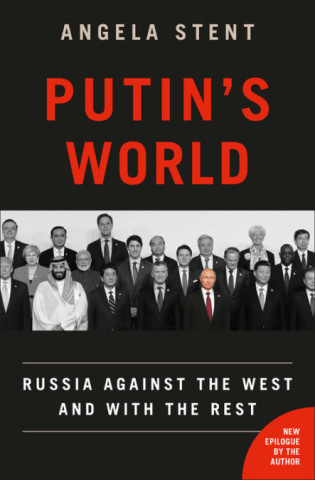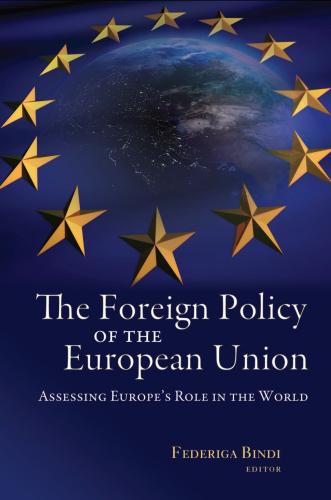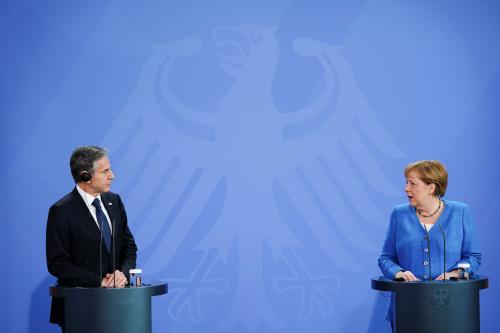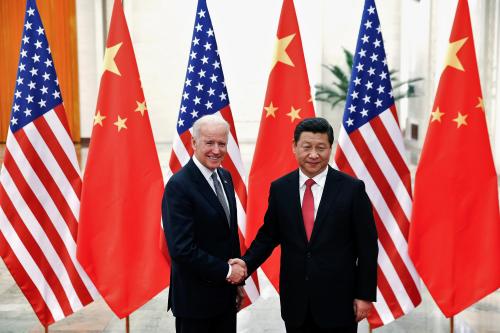Regardless of the outcome of the U.S. presidential election, China policy will remain one of the primary issues of concern to the trans-Atlantic relationship. Although a Biden administration would offer more opportunities for U.S.-European alignment, “[t]he outstanding question is […] whether the EU is really ready to hit the ground running on such a joint agenda should Biden enter the White House,” argue Erik Brattberg and Torrey Taussig. This post originally appeared in the Internationale Politik Quarterly.
Over the past few years, China’s rise has become a top priority in Washington and in many European capitals—and a big-ticket item on the wider transatlantic agenda. This development has created both new opportunities and challenges for transatlantic relations. Many Europeans who were already concerned about the Obama administration’s pivot to Asia see the Trump administration’s preoccupation with countering China’s rise as representative of a bipartisan US strategic shift away from Europe and toward prioritizing great power competition in the Indo-Pacific.
While Europe’s own outlook on China has also hardened recently—turning more skeptical and increasingly sharing many of the same American concerns—the United States and Europe have so far not been able to capitalize on this convergence by building anything resembling a coherent agenda to address jointly shared challenges from China. This task will be among the most pressing on the transatlantic agenda over the next four years, regardless of whether Donald Trump is reelected on November 3, or Joe Biden becomes the next US president.
But the outcome of the US election will certainly have consequences. While a second Trump administration would likely continue its hard-line approach toward China and unilateral approach toward Europe, room for a more strategic and broader transatlantic dialogue on China policy is possible under Biden. A Biden administration would likely attempt to renew the transatlantic partnership as part of a global effort to attempt to rebuild alliances and partnerships that have fallen into disrepair during the Trump administration.
Trump’s Unilateralism
Since Trump entered office, his administration has doubled down on a hardnosed approach toward China—albeit one frequently lacking in consistency, strategic focus, or careful execution. Underpinning Trump’s China policy is a view among many in the US national security community that a more competitive approach toward Beijing was long overdue. Both the 2017 National Security Strategy and the 2018 National Defense Strategy frame the central strategic challenge confronting the US in terms of great power competition and label China a revisionist power (though it is uncertain whether Trump himself agrees with this assessment).
The lion’s share of the Trump administration’s focus has been on unilateral actions against China on trade, technology access, and intellectual property theft. More recently, COVID-19 has sharpened the Trump administration’s criticism of China, making it even more ideologically loaded and nationalist. President Trump consistently refers to the coronavirus pandemic as the “China virus” and has beefed up anti-China rhetoric because he believes it will play well politically in the upcoming election and deflect blame away from his own administration’s ineffective handling of the pandemic at home.
The recent pledge between US Secretary of State Mike Pompeo and EU High Representative Josep Borrell to establish new EU-US China dialogue offers hope for a more joined-up approach. However, Trump’s engagement with Europe on matters related to China has underperformed, notwithstanding productive working level cooperation on issues such as 5G and investment screening.
Much of the blame for the lack of effective transatlantic coordination to date falls squarely on Trump himself. Viewing the EU as an economic competitor and a “foe,” Trump has explicitly rebuffed European overtures to join forces on addressing shared concerns about China’s market-distorting practices (such as during French President Emmanuel Macron’s state visit to Washington in April 2018). In addition to his euroskeptical attitude, Trump’s erratic leadership, mixed messages, and numerous counter-productive policies have in turn contributed to undermining European trust in his administration’s leadership. Especially damaging is Trump’s trade policy toward Europe, which includes section 232 steel and aluminum tariffs, repeated threat of imposing auto tariffs, and an overreliance on extraterritorial sanctions.
The Trump administration’s approach to multilateral cooperation—highlighted through its preferences for bilateral trade talks with Beijing, repeated moves to undermine the World Trade Organization (WTO), and withdrawal from the World Health Organization (WHO) and the UN Human Rights Council—has also been self-defeating and has given China a stronger voice at the table. Further adding to Europe’s hesitance about aligning itself too closely with the US is also the increasingly ideological undertones in the Trump administration’s approach to competing with China.
Europe’s disunity
Of course, Europeans too have fallen short. In particular, persistent disunity among EU member states on the exact nature of the China challenge and an overarching desire to maintain strong economic ties have hindered an effective common EU response. This disunity is driven not only by southern and eastern European states that may be more reliant on Chinese investment, but also from economically strong countries such as Germany.
There are several examples of how EU member states have failed to take the necessary measures to strengthen their defenses against Chinese economic and technological influence: over half of the EU member states have endorsed the Belt and Road Initiative, only 14 member states have functioning investment screening mechanisms, and countries are pursuing various approaches to the role of Huawei in 5G networks. Officials at the EU level have also acted inconsistently, at times pushing back against Beijing’s human rights abuses and policies in Hong Kong and at other times watering down EU reports of Chinese disinformation during the COVID-19 pandemic.
Should Trump be reelected, Europeans should be ready for an even more tumultuous four years. As Sino-American tensions rise in the wake of the COVID-19 pandemic, intensifying the trend toward economic and technological decoupling, European countries will increasingly face tough choices. A second Trump administration would likely continue its hardline approach toward China, as Washington and Beijing appear primed to continue their tit-for-tat retaliatory actions to cut off access to one another’s technologies and economies, with Europe increasingly caught in the middle.
A Trump administration would also likely continue its current competitive and divisive approach toward Europe, thereby limiting room for broad transatlantic cooperation on China policy despite shared grievances. Cooperation with the US will still be possible in certain areas, such as bolstering technologic defenses and standards, strengthening supply chains, and rebalancing trade, but transatlantic trust will remain very low and be plagued by disagreements in other areas.
Restoring Transatlantic Trust
China would remain a top US priority under a Biden administration. The strong bipartisan consensus in Washington on the issue means that, regardless of administration, more continuity is expected on issues such as 5G and technology decoupling, curtailing Chinese investments, and the continued focus on strategic competition in the Indo-Pacific.
The different starting-point for a Biden administration is that Washington would look to reengage with its allies and partners in Europe on a less competitive and divisive platform. Rather than seeing Europe as a competitor, Biden would view the EU as an integral partner for shaping a joint approach toward China. By defusing EU-US tensions and restoring transatlantic trust, Biden would likely be able to carry out more effective diplomatic engagement with European counterparts compared to the Trump administration’s heavy-handed unilateral approach. Moreover, by righting trade and sanctions policies, and easing political tensions on key issues such as climate change, a more fruitful agenda on shaping global standards on Artificial Intelligence (AI), semiconductors, or green tech might also be within reach.
Another welcome departure from Trump as seen by Europeans would be on the issue of multilateralism. While a Biden administration is unlikely to blindly embrace multilateralism, his administration would likely engage on multilateral reform initiatives, with a particular focus on WTO rules reform. Given Biden’s strong climate agenda, the administration could also work with Europe to hold China accountable to the climate targets that agreed to as a signatory to the Paris Climate Accords and would put a stronger emphasis on human rights (an issue that Trump has downplayed). Biden has also pledged to convene a summit of democracies and may be keen to take up the United Kingdom’s recent idea of establishing a D-10 of leading democracies in North America, Europe, and Asia.
Finally, Biden would likely take a less ideological view of China, preferring to see Beijing as a “serious competitor” but not necessarily as an opponent—mirroring the EU’s view of China as a systemic rival, a competitor, and a partner. This would make it easier for Europeans to work with Washington on China issues, as Europe shares many of the US concerns but is afraid of getting pulled into a confrontational agenda between the two superpowers.
Of course, not everything would be smooth sailing even under a Biden administration. The EU and the US will continue to have differences on many issues—including on defense spending, data protection, and export controls. Biden’s expected heavy focus on human rights might also give rise to new tensions with Europe should the US actively push for more sanctions against Chinese human rights violators or new technological restrictions that Europe is unwilling to make.
The “China Factor” After 2021
Regardless of the outcome of the US presidential election in November, how to address the rise of China and Beijing’s growing assertiveness post-COVID-19 will be one of the dominant issues in transatlantic relations under the next administration.
Even if Trump is reelected and the overall transatlantic agenda remains fraught, Europe has no choice but to continue engaging with Washington on a shared China agenda. Although there will be limits to what such an agenda can realistically achieve, there will still be some opportunities for cooperation on technology and trade issues in particular, given longstanding concerns from Washington and key European capitals about Beijing’s behavior.
In contrast, the prospect of a Biden administration will offer some early opportunities for alignment on holding China accountable to climate and trade standards while developing a broader strategic dialogue on China. Yet this also assumes greater European openness to engaging in a robust dialogue with Washington as well as continued efforts to forge a common European strategy toward China including on the dicier foreign policy issues such as Hong Kong and Taiwan or human rights in Xinjiang. The outstanding question is then whether the EU is really ready to hit the ground running on such a joint agenda should Biden enter the White House in January.
The “China factor” will be a permanent fixture on the 21st-century transatlantic agenda. And despite their many differences and disagreements, the transatlantic partners must capitalize on the reality that they have far more in common with each other than the other way around.
The Brookings Institution is committed to quality, independence, and impact.
We are supported by a diverse array of funders. In line with our values and policies, each Brookings publication represents the sole views of its author(s).












Commentary
Bonding over Beijing
September 30, 2020